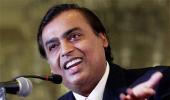Richest 10 account for 41% of promoter wealth, up from 33% in December 2018, says Krishna Kant.

The upheaval in the broader economy has reshuffled the ranks of India's billionaire promoters.
Changes in the market value of promoter stake in top private sector companies suggest that the number of billionaires is on the decline, after hitting a high in March last year.
The gap between the rich and the not-so-rich promoters also widened in 2019.
There are now 80 promoters with net worth of a billion dollars or more.
In December last year, there were 82; and in March last year, there were 91.
The 10 richest promoters in the country (in terms of net worth) are now worth nearly $180 billion.
A year ago, they were worth $140 billion.
In contrast, the 10 smallest billionaires in our list are down a fifth on an average.
Together, these promoters are now worth about $10.5 billion, down from $13 billion a year ago.
It sounds counter intuitive, but Sunil Mittal, the promoter of Bharti Airtel, gained the most and his family net worth is up 83% since December last year.
Airtel has been facing the deep financial crisis in the telecom sector.
But Bharti Airtel was the top-performing large-cap stock on the bourses this year.
The Mittal family acquired additional shares in the company through a rights issue earlier this year.
With net worth of Rs 62,000 crore ($8.7 billion), the Mittal family are now the 10th richest in the country, ahead of Dilip Sanghvi of Sun Pharma, the Burmans of Dabur, the Godrej family, and Kumar Mangalam Birla, among others.
A typical promoter has lost 22% of their net worth in the past 12 months because of a depressed share price in the broader market.
As a result, the 10 ten richest promoters now account for a 41.2% of all promoter wealth in the country, up from 32.5% and 28% in the national pie at the end of December 2018 and March 2018, respectively.

The analysis is based on the promoters's stake and market capitalisation of a common sample of 822 companies that are either part of the BSE500, the BSE Mid-Cap or the BSE Small-Cap index.
The sample excludes government-owned companies, listed subsidiaries of global multinationals, institution-owned companies, and their subsidiaries such as L&T, HDFC and ICICI Bank among others.
The sample has also been adjusted for separately listed subsidiaries of holding companies such as Reliance Industries, Tata Steel, Grasim Industries, Bombay Burmah, Reliance Capital, Bajaj Finserv, Godrej Industries, and Mahindra & Mahindra, among others.
In all, 142 out of 574 promoters in the sample have a net worth of Rs 100 crore or more at the end of trading on December 6, 2019 gained in the year.
Four hundred and thirty-two promoters lost because of a decline in m-cap of their key firms of divestments, such as Subhash Chandra of Essel Group.
The total promoters' net worth is up 3.2% -- about Rs 95,000 crore ($13.5 billion) -- since the end of December 2018.
The gains are skewed mostly in favour of the big guys.
The owners of India's top listed companies are now worth about Rs 31.1 trillion ($437 billion), up from Rs 30.2 trillion ($424.5 billion) a year ago.
Mukesh Ambani of Reliance Industries tops the list of gainers in rupee terms.
His family stake in Reliance Industries is up $21.2 billion or 47% to around $68 billion, against $46.4 billion a year ago.
He is followed by Gautam Adani of the Adani group, whose family net worth is up 24% or $3.5 billion in 2019.
There has been a strong rally in key group companies such as Adani Ports & SEZ, Adani Power, Adani Gas, and Adani Transmission in the past 12 months.
Promoters of quite a few single but successful businesses are now richer than those of diversified conglomerates.
For example, C S Ghosh of Bandhan Bank, R K Damani of D-Mart, and the Bangurs of Shree Cement are now ranked higher than traditional industrialists such as Kumar Mangalam Birla, Adi Godrej and Anil Agrawal of the Vedanta group.
At other end of the spectrum, Anil Ambani, Subhash Chandra, and Sameer Gehlaut of Indiabulls lost heavily either because of a sharp fall in the share price of their companies or divestments, or both.
The rupee to dollar conversion is based on the average exchange rate for the respective month.
For example, its Rs 71.3 to a dollar for December 2019 and Rs 70.7 for December 2018.













 © 2025
© 2025